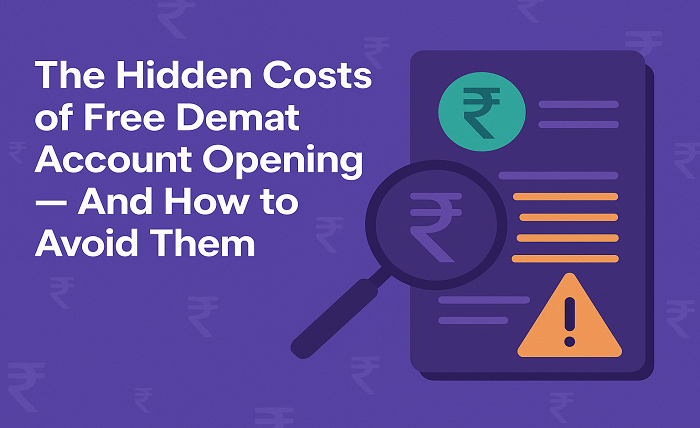The Hidden Costs of Free Demat Account Opening — And How to Avoid Them

Opening a demat account in India comes with a cost of zero rupees, and to some it is a dream come true. By simply clicking a few buttons, individuals are offered trading accounts through which they can invest in stocks, mutual funds, and even participate in IPOs without any additional fees.
This seems too good to be true, and it very much is. In marketing speak, “free” often means an array of restrictions that come alongside hidden clauses and unexpected fees.
This guide aims to shine light on the unspoken restrictions all bound users face in their quest to unlock what is marketed as “free services” and enables them to open a zero cost free demat account.
The Increase in Demand for Demat Accounts in India
We began with some fantastic growth. India has witnessed an impressive increase in active demat accounts in the last few years. This growth is quite impressive among lower-level town people. It is said by SEBI that most of the new investors are young and many prefer to open demat accounts online due to convenience. It’s obvious that the youth of India are far more approaching the equity markets. Are they aware of the hidden costs associated with the “zero-fee” marketing they are exposed to?
Let’s explore.
These are the Common Hidden Charges Associated With “Free Demat Accounts”
-
Annual Maintenance Charges (AMC)
Most platforms that offer a free demat account online will charge an AMC instead of an opening fee. Accounts in this category are usually charged:
- ₹200 – ₹999/year for basic accounts
- ₹1000 and upwards for premium accounts with more features
Some brokers also charge quarterly AMCs disguised as annual, making them easier to hide.
How to avoid it:
Look for providers promising zero AMC for lifetimes such as Share India or Paytm Money for the first year. The disclaimer often provides necessary details.
-
Exorbitant Brokerage Fees
Opening a demat account is usually free of charge in India, but many platforms profit from your trades. Brokers charge you when you buy or sell stocks, especially in:
- Day trading (buy/sell within a day)
- Futures & Options (F&O)
- Margin trades
Adjustments made by some brokers can mean a flat fee of ₹20 per trade or a percentage of your order value which may become costly for big orders.
Solutions:
Use discount brokers that offer zero brokerage on delivery trades. They also offer low fixed charges on intraday trading and F&Os.
-
Charges by the DP(Deposit Participant Fee)
This is one of the least known charges in the sector yet one of the most frequent ones. DP charges occur each time you sell a share from your demat account. Generally speaking:
- NSDL/CDSL are charging fee of 13.5 and GST
- Your broker could attach a markup costing 20 plus per transaction
Thus, even with zero brokerage, DP charges are incurred with every sale.
Solutions:
While there is no complete avoidance for DP charges, it is possible for one to be selective with their broker to ensure they don’t add more cost on top of the depository fee.
-
Charges for Physical Statements or Reports
Certain brokers provide free digital statements of transactions, however, they charge anywhere between ₹25 and ₹100 if you wish to obtain them as physical copies through mail. This is quite a lot, considering the amount would increase over time, should one favor physical documentation.
How to avoid it:
Limiting yourself to email statements or downloading contract notes via the application or portal tends to suffice. The majority of investors nowadays do not demand physical statements.
-
Call and Trade Charges
Certain brokers tangibly increase the fees for customers who wish to place orders over the phone with support staff as opposed to through the application or website.
These are not very common but can be a consideration for older individuals who are less familiar with touchscreen interfaces.
How to avoid it:
Avoid these fees if self-trading via a web based platform or application is comfortable for you. Otherwise, those needing assistance along the trading process should seek brokers with no call-and-trade fee policies.
-
Account Closure and Transfer Fees
Where some brokers charge:
- Account closure – freshly charging customers ₹50 to 100
- Again referring to shutting down portals or accounts, users get charged for moving their securities to a new demat account.
How to avoid it:
Make sure you go through the terms and conditions regarding account closure before registering. Well known platforms provide zero charge accounts, meaning no fees are required to be paid in mid account closure, should conditions dictate that there are no lingering debts.
-
Fee Structure on the Inactive Account
Some brokers impose fees if your account is dormant for more than 12 months. These may include:
- Reactivation fees
- Cancellation of AMC waiver
- Penalty fees
Prevention:
Execute at least one transaction every 6 to 12 months or select brokers who do not penalize inactivity.
Hint: Identifying the true cost before you open free demat account
Go to the pricing page of the broker’s website – In the case of free Demat accounts, brokers usually have a marketing campaign with ads. Ignore the highlighted sections and look instead for the fine print detailing fees.
Explore review sections of social media such as, Quora or application stores – Users often make comments concerning expenses that aren’t featured on the official website.
Pose the following questions prior to opening a free demat account:
- What is the reassessed AMC after the first year?
- Are there any DP fees charged each time there are transactions?
- What is the rate of brokerage payable for day trading and F&O?
- Are there any charges for investing in mutual funds?
Search for a broker that uses transparent pricing such as Share India, Zerodha, Groww, Angel One or Paytm Money as these platforms clearly state all fees including hidden charges.
Best Qualities of a Truly Low Cost Demat Account of 2025
When checking on the web and searching for platforms offering free demat account opening, try to find the following things:
₹0 for opening an account ₹0 AMC (at least for year one) ₹0 brokerage for delivery trades Low flat fees for intraday and F&O trades Transparent charges DP charges No penalties for inactivity Mutual fund and IPO access Integration with other trading services
Concluding Remarks: Opening a Free Demat Account is Not Enough, Make Sure It is the Right One
As “free demat account opening” becomes a common expression in marketing campaigns, the actual expense tends to be hidden somewhere in the declarations. In today’s era, your task as a new investor is not to simply dive in, but to do so in a well-considered fashion.
Different platforms offer free demat accounts – look at each one, conduct the proper due diligence and take into account your goals that extend into the distant future. A platform that boasts lower fees, costs, and easy-to-understand terms not only enhances your financial health, but also ensures better investment growth over time.
Bear in mind that “free” is only truly free when it is unlocked by something that is understood.




